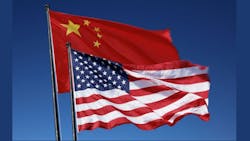BEIJING -- At the start of annual talks expected to focus on cyber-security, maritime disputes, the Chinese currency and an investment treaty, China and the United States need to manage their differences, the leaders of both countries said on Wednesday.
The two-day talks in Beijing, called the Strategic and Economic Dialogue, will be an opportunity for the world's two biggest economies to dial down tensions after months of bickering over a host of issues, experts have said.
U.S. Secretary of State John Kerry and Treasury Secretary Jack Lew chair the U.S. delegation, with Vice Premier Wang Yang and top diplomat Yang Jiechi leading the Chinese side.
President Xi Jinping said Sino-U.S. cooperation was of vital importance to the global community. "China-U.S. confrontation, to the two countries and the world, would definitely be a disaster," he told the opening ceremony at a government guesthouse in the west of the city.
"We should mutually respect and treat each other equally, and respect the other's sovereignty and territorial integrity and respect each other's choice on the path of development."
Escalating tensions between China and some countries in the South China Sea and with Japan in the East China Sea as well as U.S. charges over hacking and Internet spying have provoked ire on both sides of the Pacific in recent months.
In a statement released as the discussions began, U.S. President Barack Obama said the United States was committed to building a "new model" of relations with China that is defined by cooperation and the constructive management of differences.
"The United States welcomes the emergence of a stable, peaceful, and prosperous China," Obama said. "We remain determined to ensure that cooperation defines the overall relationship."
A senior U.S. administration official said discussions between Kerry and senior Chinese officials included candid discussions over human rights, maritime disputes and cyber espionage.
"The Secretary made the case to the Chinese for the wisdom of getting back to work in the cyber working group," the official said, referring to talks which were suspended in May when the U.S. charged the five Chinese military officers with hacking.
"He made clear that we are very much of the view that these issues are sufficiently important to warrant us rolling up our sleeves and tackling them."
Market-Drive Yuan
Despite deeply interconnected business ties and two-way trade worth more than half a trillion dollars a year, Beijing and Washington have deep differences over everything from human rights to the value of the Chinese currency, the yuan.
Washington has begun to push for China to move to a market-driven exchange rate.
"We support China's efforts to allow the market to play a more decisive role in the economy and rely more on household consumption to drive China's economic growth. Moving to a market-determined exchange rate will be a crucial step," Lew said at the opening ceremony.
Critics say China artificially suppresses the value of the yuan to protect its exporters, an accusation China has always denied.
Chinese Finance Minister Lou Jiwei defended the country's currency interventions, saying it was difficult to take a hands-off approach when it came to the yuan, given an unsteady economy and abnormal capital inflows.
"The U.S. side has constantly raised the issue about whether intervention is no longer needed in our foreign exchange policy," Lou told reporters at a briefing. "But we say it's difficult when the economy has yet to fully recover, and cross-border capital flows are not normal."
He said he hoped U.S. authorities could do their part to keep the U.S. economy growing at a steady clip, and that Washington should be mindful of the spillover effects of its ultra-loose monetary policy.
"The normalization of U.S. monetary policy has drawn wide attention," Lou said. "We hope the U.S. side can act prudently."
The annual talks, now in their fifth year, have yielded few substantive agreements, in part because relations have grown more complex with China's increasing military, diplomatic and economic clout.
Still, U.S. officials have underscored the importance of the discussions to help ensure the relationship doesn't drift towards confrontation.
Xi said both countries should strengthen cooperation in fighting terror and speed up talks on a bilateral investment treaty to reach an agreement at an early date.
The United States hopes the treaty will loosen Chinese restrictions to allow for a more level playing field for U.S. companies in China. Chinese officials say they hope it will help drive China's own domestic reforms.
The U.S. official said Kerry explained U.S. viewpoint on the East and South China Sea disputes, emphasizing neither was "a situation in which countries should or can be permitted to act unilaterally to advance their territorial claims".
Washington has not taken sides in the disputes but has been critical of China's behavior in the potentially energy-rich South China Sea, where the Philippines, Vietnam, Malaysia, Brunei and Taiwan have overlapping territorial claims with China.
Beijing, though, views the United States as encouraging Vietnam and the Philippines to be more aggressive in the dispute, and of backing its security ally Japan in the separate spat over uninhabited islands in the East China Sea.
Kerry reiterated that the United States was not seeking to "contain" China.
"We have a profound stake in each others success," he said. "I can tell you that we are determined to choose the path of peace and prosperity and cooperation, and yes, even competition, but not conflict."
By Lesley Wroughton and Michael Martina
(Additional reporting by Kevin Yao; Writing by Ben Blanchard; Editing by Dean Yates and Raju Gopalakrishnan)
Copyright Reuters, 2014
